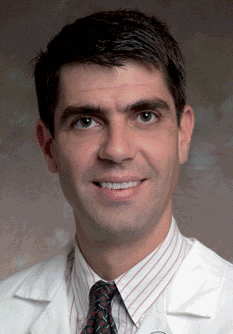In his experience, Dr. Johns said he quite likes the in-office approach for injections and selected focal papillomas and polyps. However, extensive disease is more easily managed in the OR. Any procedure requiring high levels of precision is better off done under anesthesia.
Explore This Issue
August 2009 Spend time observing someone with experience doing the procedure. It is not hard, but it is filled with nuance, which makes the difference between good outcomes and bad ones.
Spend time observing someone with experience doing the procedure. It is not hard, but it is filled with nuance, which makes the difference between good outcomes and bad ones.
-Michael M. Johns III, MD
Tips for Successful Procedures
Consent and explaining to patients about what to expect are important issues for in-office procedures, Dr. Wallace said. I take extra time and talk about the options-we can do it in the OR, or we can do it here. Most people just want to get it done, he said.
Patient selection is key too. Not everyone who might physically qualify for an in-office procedure will be comfortable there. Some people are nervous or skittish. It’s key to know the patient on whom you are performing a procedure.
As for topical anesthesia, it is important to take the time to do it properly, even if it is tempting to go forward quickly, Dr. Wallace said. Be careful not to overanesthetize, because that can decrease the patient’s ability to handle normal secretions.
The assistant helping with the office-based procedure needs to be trained, but it may be useful to not let the assistant see the monitor while helping. What appears on the monitor can be misleading for someone without much experience, and it is easy for an assistant to overshoot the lesion when opening and closing the forceps.
Dr. Wallace also advises not letting the patient see the monitor-it increases the likelihood they might try to say something or move their vocal fold.
For patients who are on anticoagulants, it is appropriate to reschedule the procedure for at least a week from the point of stopping their anticoagulation medication; otherwise, there is a risk of excessive bleeding. If a patient cannot stop anticoagulation therapy, consider biopsy under anesthesia, Dr. Johns said.
Another contraindication is biopsy of thin superficial lesions of the true vocal fold. This can lead to inadvertent removal of more healthy tissue than desired, leading to scarring and dysphonia, Dr. Johns said.
Patients should preferably not eat two hours before to two hours after the procedure. Sometimes if I see somebody in the clinic and it’s early afternoon, or mid-morning, and I say ‘when did you eat,’ if it’s appropriate, I still do the biopsy if I need to, Dr. Wallace said. Some folks you can do right away; others need to come back later, he said.
Leave a Reply